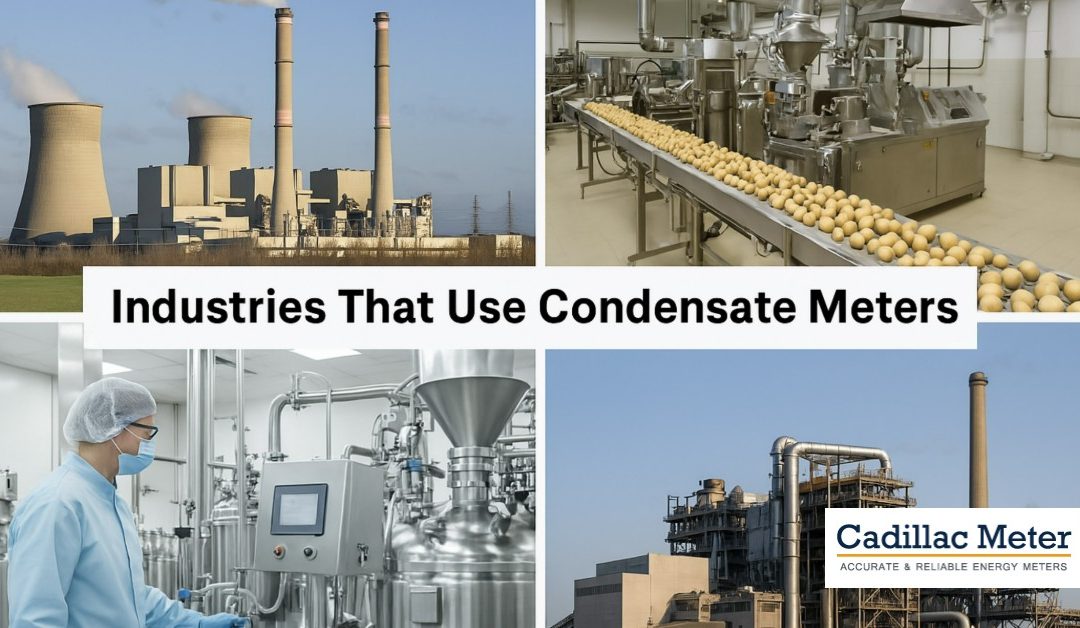In the world of energy, data is power—and nowhere is that more evident than in the industries that rely on condensate meters. From massive power plants to pharmaceutical facilities, industries that use condensate meters all share one thing: the need for accurate, reliable, and maintenance-free flow measurement of steam condensate.
As someone who runs a company known for delivering precision energy measurement solutions, I’ve seen firsthand how critical these meters are—not just for compliance, but for real performance gains. So let’s break it down.
What Is a Condensate Meter?
Before we go industry-specific, a quick refresher: condensate meters measure the flow of liquid condensate in steam systems. After steam is used in heating or processing, it condenses back into water—this is called condensate. Measuring this return flow is key to tracking energy use, detecting system inefficiencies, and reclaiming resources.
Top Industries That Use Condensate Meters
Let’s take a tour through the major industries that depend on condensate meters, and why these tools are non-negotiable.
1. Power Generation
Why they use them:
In power plants, especially those running on steam turbines, condensate meters are vital for monitoring steam cycle efficiency. They measure flow returning to the boiler and help identify losses or failures in the system.
Benefit:
Prevents energy waste, supports closed-loop system integrity, and minimizes downtime.
2. Petrochemical & Refining
Why they use them:
These facilities handle extreme temperatures and pressures. Condensate meters ensure the integrity of steam tracing systems and heat exchangers. They also help monitor returns from hazardous or corrosive environments.
Benefit:
Improves safety, process control, and cost recovery on steam use.
3. Pharmaceutical Manufacturing
Why they use them:
Clean steam is used in sterile environments. Condensate measurement ensures no contamination and allows accurate monitoring of energy used in critical processes like autoclaving and sterilization.
Benefit:
Meets strict FDA and GMP compliance, while reducing utility costs.
4. Food and Beverage Processing
Why they use them:
Steam is essential for cooking, sterilizing, and pasteurizing. Industries that use condensate meters like this rely on tight control of steam usage to meet food safety standards and maintain product consistency.
Benefit:
Reduces waste, improves energy efficiency, and ensures product safety.
5. Pulp and Paper
Why they use them:
In paper mills, steam is used extensively for drying. Condensate meters measure return flow from dryers, optimizing the energy balance in the system.
Benefit:
Enhances throughput, reduces energy costs, and supports environmental compliance.
6. Hospitals and Healthcare Facilities
Why they use them:
Hospitals use steam for heating, sterilization, and laundry. Condensate meters ensure that energy isn’t lost and that all systems are functioning efficiently and safely.
Benefit:
Improves reliability of life-saving infrastructure while cutting utility bills.
7. Universities and District Energy Systems
Why they use them:
Campus steam loops heat multiple buildings from a central plant. Accurate condensate metering helps allocate energy use, monitor performance, and identify inefficiencies in the system.
Benefit:
Enables proper billing, energy tracking, and planning for upgrades.
8. Textile and Dyeing Industry
Why they use them:
Steam is used for dyeing, drying, and setting fabric. Monitoring condensate helps maintain process quality and saves on operational costs.
Benefit:
Improves consistency of color and fabric quality while saving energy.
Why These Industries Rely on Condensate Meters
Here’s why industries that use condensate meters are miles ahead of the ones that don’t:
- Energy Efficiency: Steam systems are only as efficient as the data you gather.
- Operational Control: Real-time measurement allows for proactive maintenance and fewer shutdowns.
- Cost Reduction: Every drop of condensate returned means less makeup water and fuel needed.
- Sustainability: Less waste, less energy use, lower carbon emissions.
- Compliance: Regulatory bodies require accurate metering for reporting and inspections.
For a deeper dive into energy metering best practices, check out this guide from the U.S. Department of Energy.
Industries That Use Condensate Meters – The Common Thread
Regardless of the sector, the common thread is clear: condensate meters are a non-negotiable tool for high-efficiency operations. They’re quiet, often unseen, but they deliver critical insights every day.
Ultrasonic, magnetic, or differential pressure—choose the right meter, and it’ll pay for itself in months. Ignore it, and you’ll bleed energy costs without even knowing it.



